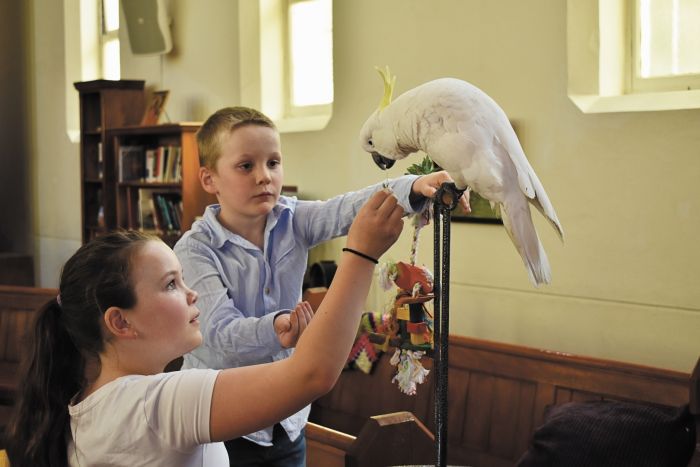The season follows a three-year cycle of services of worship according to ecological themes. Planet Earth, humanity, sky and mountains comprised the four weeks celebrated this year on September 2, 9, 16 and 23 respectively (www.seasonofcreation.com).
At South Sydney Uniting Church in Waterloo, congregants heard homilies and sang and made prayers on the themes, offered gifts of creation and work of their hands for the altar table, including pottery and rolled beeswax candles, and shared in the Eucharist (bread and wine, Christ’s body and blood). At the end of each service, they were called to “build God’s kin-dom” amidst the “many needs, challenges, troubles on Earth” and to attend to “the wonders of God” and “all those creatures who live and move and have their being in God”.
St George’s Anglican Church in Paddington hosted guest preachers throughout September. The church also held a workshop for the community to learn how to make beeswax wraps, using wax from the hive onsite.
Various other activities took place during the season. Uniting Earth Ministry hosted a “Hope in Action” national e-conference on September 23 and 25. Presenters from NSW, Victoria and South Australia gathered online to discuss religious faith in the context of climate change, hope and activism, coal seam gas and coal mining, consumerism and co-housing, social research and the role of local congregations (www.unitingearthweb.org.au).
Speaking at South Sydney Uniting Church on Planet Earth Sunday, the Rev. Andrew Collis said: “We are Earthlings, each one of us. And today’s theme critiques dualism, any kind of dualism, that sets human being over and against the being of Earth. For Christ’s sake, we are called to resist all arrogance, violence, superiority. Whatever it means to be saved by the blood of the Lamb entails rejecting sacrificial or religious violence, and entails loving concern for fellow creatures, lambs included.”
Reflecting on one of the Bible passages for Humanity Sunday, Waterloo writer and teacher Catherine Skipper said: “The grounds for believing that Christians perceive themselves as having ‘dominion’ over creation, comes from Genesis 1:26-28 … Clearly, humankind was made so that we may ‘rule over’ creation, but rule as God ruled since we are made in the divine image.
“How does God rule? Creatively, abundantly, thoughtfully, providentially and above all, looking at what God has done and seeing that it is ‘good’. Good, it seems, in the case of the creatures inhabiting water and sky, means that they ‘teem’, are plentiful and multiply … God is concerned with abundance, diversity, continuance and sacredness.”
Dr Miriam Pepper, a co-founder and active member of Uniting Earth Ministry, spoke at St George’s Anglican Church on Humanity Sunday. She responded to the creation narrative from Genesis 2, which sees the first human charged to “serve and protect” the land: “In inner Sydney, where subjugation of the local environment has almost been complete, our efforts to serve the earth need careful, care-filled cultivation. I think of: efforts to protect pockets of biodiversity and connect them – in places like Sydney Park; urban food growing – community gardens, rooftop gardens, bee keeping; closing the water cycle – rainwater collection, use, retention; greater localisation of our energy system – rooftop solar.”
On Mountain Sunday, lay preacher and biologist Margaret Vazey shared her sense of prayerful wonder with the South Sydney congregation in the context of an ancient story. “Tiny fragments of crystals on Mount Narryer in Western Australia have been dated as 4.1 billion years old. These are in what are probably the oldest rocks in Australia. Yet even these show signs of having been made from the fragments of even earlier rocks.”
At both South Sydney and Paddington, the season concluded with blessings of the animals. An offering was taken at South Sydney for the good work of WIRES (Wildlife Information, Rescue and Education Service, www.wires.org.au).
Dr Byron Smith, Assistant Pastor at St George’s Paddington, said of the significance of the Season of Creation: “Having and being a body, dependence upon the web of life, receiving rain and sunshine from the Creator and Sustainer of life, living as an animal with other animals: themes like these are of perennial importance and yet too often have been neglected by the church … Today, they take on an added urgency and resonance in a wounded and warming world of falling forests, disappearing birdsong, plasticised oceans and eroding soils.”





